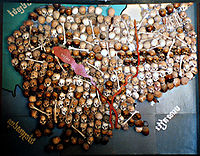Judges agree on rules for Khmer Rouge tribunal
Wednesday, June 13, 2007

After months of infighting, rules governing the proceedings of the first-ever trial of leaders of the genocidal Khmer Rouge in Cambodia have been unanimously agreed upon by Cambodian and international judges in Phnom Penh.
"These rules will ensure us fair and transparent trials," co-prosecutor Robert Petit told reporters. "Now that the rules are adopted, we can move forward."
Backed by the United Nations with a budget of US$56 million, the Extraordinary Chambers in the Courts of Cambodia was expected to start this year. But since being sworn in last July, the panel of foreign and Cambodian jurists have disputed the rules that govern the court, which stipulate such details as lawyer's fees and the height of the judge's chairs. The court is expected to start holding hearings next year and last for three years.
One of the key issues holding up the trial was the insistence of the Cambodian Bar Association that foreign lawyers in the trial pay a fee of $2,700. International judges disputed the fee, which they said was too high and would place an undue burden on volunteer defense lawyers. As a compromise, the fee has been lowered to $500.
The Khmer Rouge, a Maoist communist regime, ruled Cambodia from 1975 to 1979. Led by Pol Pot, the regime's plan was to redevelop Cambodia into an agrarian utopia that had no money, religion, schools or social classes. As many as 2 million people died of starvation or overwork in labor collectives and in genocidal purges.
Pol Pot died in 1998, but two other high-ranking Khmer Rouge officials, Khieu Samphan and Ieng Sary, are still alive and living freely in Cambodia. Both men, as are many other Khmer Rouge leaders, are old and suffering from health problems. Another leader, the military commander Ta Mok, died last year while in prison. One other leader, Khang Khek Ieu, the administrator of the Tuol Sleng torture center, is in prison awaiting trial.
Many members of the current government of Cambodia are former Khmer Rouge, including Prime Minister Hun Sen.
Critics of the trial say the $56 million pricetag is too much.
Among the critics is John Gunther Dean, who was U.S. ambassador to Cambodia when Phnom Penh fell to the Khmer Rogue in 1975.
"I think the $56 million which has been collected to convict half a dozen people, would it not be much better to use that to build some hospitals under the name of 'Lest We Forget?'" he said in a recent interview with Voice of America.
Youk Chhang, director of the non-profit Documentation Center Cambodia, which collects and archives Khmer Rouge records, said the money for the trial has come from voluntary donations, and does not take funds away from such things as building schools or hospitals, and will help Cambodia rebuild its rule of law.
Related news
- "Khmer Rouge "Butcher" dies ahead of trial" — Wikinews, July 21, 2006
Sources
- Seth Meixner, Agence France-Presse. "Judges clear way for genocide trials in Cambodia" — France 24, June 13, 2007
- "Khmer Rouge trials ready to start" — BBC News Online, June 13, 2007
- Deutsche Presse-Agentur. "Khmer Rouge tribunal takes a step forward in Cambodia" — Earth Times, June 13, 2007
- Allison Rhines. "Final agreement reached in Khmer Rouge trial negotiations" — Stanford Review, June 13, 2007
- Poch Reasey. "Former US diplomat questions worth of planned Cambodia tribunal" — Voice of America, June 12, 2007
External links



